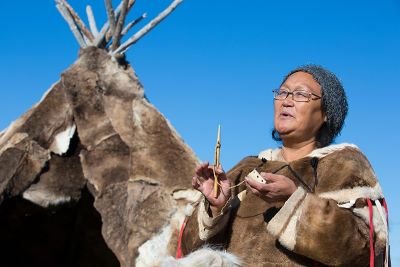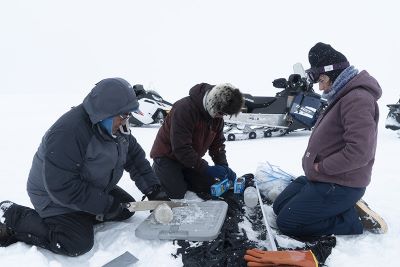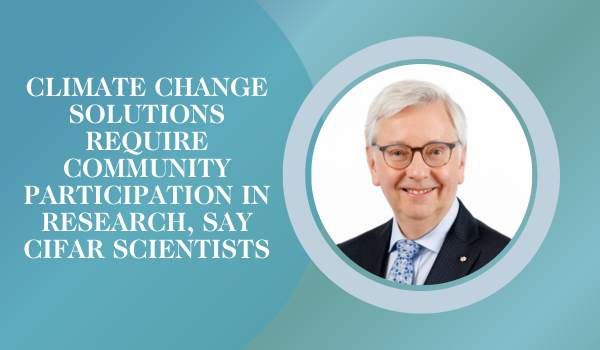Indigenous Peoples must lead research in the Arctic and Canada’s North, expert panel says
 Indigenous Peoples must take the lead in scientific research in the Arctic and Canada’s North to achieve greater inclusivity, collaboration and effectiveness, says a new report by the Council of Canadian Academies (CCA).
Indigenous Peoples must take the lead in scientific research in the Arctic and Canada’s North to achieve greater inclusivity, collaboration and effectiveness, says a new report by the Council of Canadian Academies (CCA).
Arctic and Northern research has long been centred on Southern voices, needs, priorities and institutions, according to the report. “As a result of longstanding Southern influences, numerous systemic challenges have gone unaddressed and continue to negatively impact Arctic and Northern research in Canada.”
Transformational change in research means shifting decision-making influence from the South to the North or any changes achieved with remain superficial, said the report, “Northern Research Leadership and Equity.”
“The future of Arctic and Northern research in Canada depends on a transformational shift that prioritizes Indigenous leadership, voices, and engagement,” it said.
Equitably transforming the Arctic and Northern research system also includes increasing investment to build human, financial and infrastructure capacity, according to the report.
The independent, peer-reviewed report by a 10-member expert panel was requested and sponsored by a consortium of 45 organizations across Canada, including federal and territorial government departments, several universities, Indigenous organizations, and Arctic and Northern research groups. The consortium was led by ArcticNet.
ArcticNet is a Network of Centres of Excellence of Canada (NCE), based at Université Laval in Quebec and University of Ottawa, jointly funded by Canada’s Tri-Council research funding agencies with $146 million until 2025. Funding for the 30-year-old NCE program is being phased out and being replaced by the New Frontiers in Research Fund.
ArcticNet brings together scientists, engineers and other professionals in human health, natural and social sciences with partners from Inuit organizations, Northern communities, federal and provincial agencies and the private sector, to study the impacts of climate and socio-economic change in Canada’s North.
 The CCA’s expert panel was co-chaired by Dr. Ashlee Consolo, PhD (photo at near left), vice-provost and dean at the School of Artic and subarctic studies at Memorial University’s Labrador campus, and Dr. Karla Jessen Williamson, PhD (photo at far left), a Greenland-born Inuit, associate professor of educational foundations at the University of Saskatchewan, and who was the first woman executive director of the Arctic Institute of North America.
The CCA’s expert panel was co-chaired by Dr. Ashlee Consolo, PhD (photo at near left), vice-provost and dean at the School of Artic and subarctic studies at Memorial University’s Labrador campus, and Dr. Karla Jessen Williamson, PhD (photo at far left), a Greenland-born Inuit, associate professor of educational foundations at the University of Saskatchewan, and who was the first woman executive director of the Arctic Institute of North America.
This particular CCA report was guided by the perspectives of Raven and Wolf – central figures in many Northern Indigenous knowledge systems. Raven brought light to the world, ending the ancient darkness. Wolf is associated with, among other things, good communication, understanding and intelligence.
The panel also framed its perspective around the United Nations Declaration on the Rights of Indigenous Peoples, and the Calls to Action by Truth and Reconciliation Commission of Canada.
The panel identified four key elements necessary for ensuring that Arctic and Northern research in Canada is inclusive, collaborative, and “most importantly, ethical,” across all dimensions of the research system – including funding, infrastructure, data and education. These elements are:
- It is essential that Arctic and Northern research in Canada is just and furthers Indigenous Peoples’ right to self-determination.
- Ensuring inclusivity and effectiveness in research requires a system that provides cultural security.
- An effective, inclusive, and collaborative Arctic and Northern research system upholds accessibility for all aspects, including processes and outputs.
- Effective, inclusive, and collaborative Arctic and Northern research is rooted in responsibility and reciprocity, and in a sense of accountability to Northern Indigenous Peoples.
“Arctic and Northern research in Canada has long been dominated by Southern researchers and institutions as well as Southern interests, needs, priorities, and perspectives,” the expert panel said. “This has been reflected in approaches to research that ignore Indigenous Peoples and their rights, cultures, and knowledges, all of which are vital to understanding Arctic and Northern environments and societies.”
In doing its work, the panel said it recognized that all components of the research system – funding, infrastructure, data and education – “elevate the narratives of the South. The Southern perspective continues to be pervasive and has diminished Indigenous Peoples' priorities and goals, thereby instilling the notion that Indigenous Peoples are merely supplementary.”
Multiple systemic problems need addressing
Canada’s current research funding system, which relies heavily on the publicly funded Tri-Agencies, is largely grounded in, and thus prioritizes, Western knowledge systems, the panel said. “A long-term vision for just and ethical Arctic and Northern research is one that expands access, improves coordination among different research entities and funders, reduces overlap, and enhances accountability to Northerners.”
 Within existing funding structures, eligibility criteria can be adjusted to promote inclusivity and enable strong partnerships, the panel’s report suggested. Specialized funding streams and transdisciplinary or collaborative approaches can address critical Indigenous research priorities and support Indigenous-led research.
Within existing funding structures, eligibility criteria can be adjusted to promote inclusivity and enable strong partnerships, the panel’s report suggested. Specialized funding streams and transdisciplinary or collaborative approaches can address critical Indigenous research priorities and support Indigenous-led research.
“Such shifts in influence would better prioritize social accountability in research, which, in the view of the Panel, would enhance the collaborative nature of Arctic and Northern research in Canada.”
The panel’s report identified other changes required to funding structures, including: streamlined and simplified funding applications; greater flexibility in the use of funds; and dedicated, sustained funds for training and capacity-building, particularly for ongoing research projects and monitoring efforts.
Increasing the total funding spent on Arctic and Northern research, as well as increasing Northern research institutions’ access to funding, is required for Canada to be globally competitive, the report said.
It noted that improving publicly accessible tracking and monitoring of data – for both research outcomes and spending – would support a more fulsome understanding of the local economic and social impacts of research as it relates to the Indigenous and non-Indigenous people living in Arctic and Northern communities.
A just research system recognizes Indigenous Peoples’ rights to own and control their data and various knowledges, the panel’s report said. “There are ongoing efforts to solidify Indigenous data sovereignty and data stewardship, but there has not been adequate support and capacity building to enable them to reach their full potential.”
Current processes of research ethics review and approvals don’t adequately recognize the rights and priorities of Indigenous Peoples, according to the report. Also, the current system of ethics review and license/permit approvals in Arctic and Northern research is disjointed and overly complex, resulting in duplication of efforts and accessibility barriers – especially for Northern-based researchers.
“Shifting the responsibility of ethics review and research approvals to Indigenous Peoples or their institutions can reduce some of these barriers while simultaneously ensuring self-determination and culturally appropriate review,” the panel said.
However, the panel added that increased support and capacity-building by and for researchers are also needed for effective review and engagement by Indigenous organizations to be fully realized.
Increased support required for capacity-building, access to infrastructure
Currently, disciplinary divides result in significant barriers to accessing the infrastructure needed to engage in effective research that addresses the needs and priorities of Northern communities, according to the report.
“Support for multidisciplinary programs can provide research capacity beyond the scope of individual researchers and supports collaborative, interdisciplinary and potentially cross-cultural research outcomes and benefits.”
The panel pointed out that a majority of research stations in the North are not owned and operated by Northern institutions or Indigenous communities, “limiting the influence of Northern voices on the research being carried out.”
 Greater support for Northern post-secondary institutions, and stronger partnerships between them and outside researchers (Southern and foreign) working in the North, may provide the groundwork for long-term, effective, and meaningful engagement between the research community and Northern Indigenous Peoples, the panel said.
Greater support for Northern post-secondary institutions, and stronger partnerships between them and outside researchers (Southern and foreign) working in the North, may provide the groundwork for long-term, effective, and meaningful engagement between the research community and Northern Indigenous Peoples, the panel said.
The panel also noted that many structures and services that support effective research are not sufficiently resourced in the North. For example, community infrastructure – which includes housing, professional spaces, telecommunications, road and air travel networks, and physical and mental health services – does not meet the needs of Northerners.
“Improved access to such structures and services would directly support the self-determination of Northern Indigenous Peoples, improve opportunities for meaningful collaboration, and, as a result, strengthen the overall research capacity of the North,” the panel said.
Before engaging in Arctic and Northern research, researchers must take it upon themselves to develop an understanding of the histories, realities, and contexts of Indigenous Peoples in the Arctic and North, with particular focus on those that may be directly or indirectly impacted by proposed research, the report said.
Said the panel: “A long-term vision for just and ethical Arctic and Northern research is one that expands access, improves coordination among different research entities and funders, reduces overlap, and enhances accountability to Northerners.”
Note: All photos by ArcticNet
R$
Events For Leaders in
Science, Tech, Innovation, and Policy
Discuss and learn from those in the know at our virtual and in-person events.
See Upcoming Events
You have 0 free articles remaining.
Don't miss out - start your free trial today.
Start your FREE trial Already a member? Log in
By using this website, you agree to our use of cookies. We use cookies to provide you with a great experience and to help our website run effectively in accordance with our Privacy Policy and Terms of Service.





